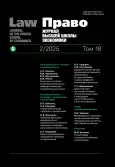ESG Principles Implementation in the Russian Corporate Governance Model: Conditions, Issues and Prospects
- Authors: Aleshkova I.1, Kodaneva S.1
-
Affiliations:
- Institute of Scientific Information on Social Sciences
- Issue: Vol 18, No 2 (2025)
- Pages: 118-138
- Section: Russian Law: Condition, Perspectives, Commentaries
- URL: https://journal-vniispk.ru/2072-8166/article/view/317614
- DOI: https://doi.org/10.17323/2072-8166.2025.2.118.138
- ID: 317614
Cite item
Full Text
Abstract
The practice of implementing ESG principles related to the environment, society and corporate governance and aimed at achieving sustainable development goals is rapidly spreading around the world. These principles are increasingly considered as guidelines for managers, financial analysts, investors and other stakeholders in the development of socially oriented business. The authors present the features of the implementation of principles mentioned in the Russian corporate governance. It is noted that the emergence and widespread use of ESG principles maintains the development of social and environmental entrepreneurship focused on the common good. It is emphasized that ESG principles are interconnected with the principle of good faith in entrepreneurial activity and the principle of freedom of contract. Attention is drawn to the fact that the development of legal regulation governing responsible supply chains contributes to the spread of the practice of introducing ESG principles into corporate governance. The purpose of the study is to characterize the emerging model of implementing ESG principles in Russian corporate governance, review the practice of implementing these principles in Russian companies, identify issues and prospects for their development.
About the authors
I. Aleshkova
Institute of Scientific Information on Social Sciences
Email: ialeshkova@mail.ru
ORCID iD: 0000-0001-5054-5939
S. Kodaneva
Institute of Scientific Information on Social Sciences
Email: kodanevas@gmail.com
ORCID iD: 0000-0002-8232-9533
References
- Agafonov V.B. (2024) ESG principles and greenwashing: legal aspects of differentiation. Aktualnye problemy rossiyskogo prava=Issues of Russian Law, no. 9, pp. 132–141 (in Russ.)
- Antonova E.G. (2024) ESG standards in the structure of corporate legal relations. Khozyaistvo i pravo=Business and Law, no. 6, pp. 14–26 (in Russ.)
- Avakov V.A., Shinkevich A.I. (2024) The system of indicators of the ESG concept performance: status and assessment prospects. Vestnik Samarskogo gosudarstvennogo universiteta=Bulletin of Samara State University, vol. 15, no. 3, pp. 59–68 (in Russ.)
- Belitskaya A.V. (2023) Legal incentives for investing in sustainable development. Pravo i biznes=Law and Business, no. 1, pp. 5–11 (in Russ.)
- Bushev A. Yu. (2023) The principle of good faith in the decisions of the Constitutional Court of the Russian Federation. Zakon=Law, no. 9, pp. 156–169 (in Russ.)
- Dell’Erba M., Gomtsyan S. (2024) Regulatory and investor demands to use ESG performance metrics in executive compensation: right instrument, wrong method. Journal of Corporate Law Studies, vol. 24, no. 1, pp. 1–40.
- Gonzáleza M.A., Portilloa A.F. et al. (2020) Entrepreneurial activity and economic growth. A multi-country analysis. European Research on Management and Business Economics, no. 1, pp. 9–17.
- Kartskhia A.A. (2022) Corporate governance in context of global climate change. Grazhdanskoye pravo=Civil Law, no. 2, pp. 16–20 (in Russ.)
- Kozhevina O.V. (2022) Aspects of greenwashing and unfair commercial practices of business entities in the context of a green economy. Konkurentnoe pravo=Competition Law, no. 4, pp. 12–15 (in Russ.)
- Levin V.S. (2022) On disclosing non-financial information in the context of sustainable development and ESG risk assessment. Financy=Finance, no. 3, pp. 39–48 (in Russ.)
- Mitrofanov D.A. (2024) Codes of professional ethics within the system of corporate relations regulation. Pravo i management. XXI Age=Law and Management. 21th century, vol. 20, no. 1, pp. 147–158 (in Russ.)
- Mosin S.A. (2023) Properties of the constitutional principle of good faith of subjects of legal relations. Pravo. Zhurnal Vysshey shkoly economiki=Law. Journal of the Higher School of Economics, vol. 16, no. 1, pp. 27–45 (in Russ.)
- Orekhova S.V., Kudin L. Sh. (2019) Russian model of corporate governance: evolution, specificity, efficiency. Vestnik Cheliabinskogo gosudarstvennogo universiteta. Economicheskie nauki=Bulletin of Chelyabinsk State University. Economy, no. 3, pp. 140–152 (in Russ.)
- Povetkina N.A. (2022) The category of “good faith” in budget law: problem statement. Finansovoe pravo=Financial Law, no. 12, pp. 7–9 (in Russ.)
- Skurko E.V. (2024) The essence, transformations and future of law. Sotcialnye i gumanitarnye nauki. Otechestvennaya i inostrannaya literatura. Gosudarstvo i pravo=Social and Humanitarian Sciences. Domestic and Foreign Literature. State and Law, no. 2, pp. 156–170 (in Russ.)
- Solovey T.N., Teplova O.A. (2025) Double materiality, or how to go beyond the matrix of material topics when forming sustainable development reports. Miezhdunarodnyi buhgalterskiy uchet=International Accounting, no. 1, pp. 79–99 (in Russ.)
- Sukhanov E.A. (2024) Corporate Law in the Civil Code of the Russian Federation. Vestnik grazhdanskogo prava=Civil Law Bulletin, no. 5, pp. 56–67 (in Russ.)
- Trahan R.T., Jantz B. (2023) What is ESG? Rethinking the «E» pillar. Business Strategy and the Environment, no. 7, pp. 4382–4391.
- Zainullin S., Pereladov A.et al. (2022) ESG principles: what are they and why should companies comply with them. Trudovoye pravo=Labor Law, no. 12, pp. 57–73 (in Russ.)
- Zasemkova O.F. (2024) Personal data protection as one of the components of the ESG agenda. Miezhdunarodnoye publichnoye i chastnoe pravo=International Public and Private Law, no. 1, pp. 41–45 (in Russ.)
- Zenkina I.V. (2024) Integration of sustainable development factors into corporate financial reporting in the context of modern realities of the ESG agenda. Mizhdunarodnyi buhgalterskyi uchet=International Accounting, no. 5, pp. 499–517; no. 6, pp. 606–625 (in Russ.)
Supplementary files








